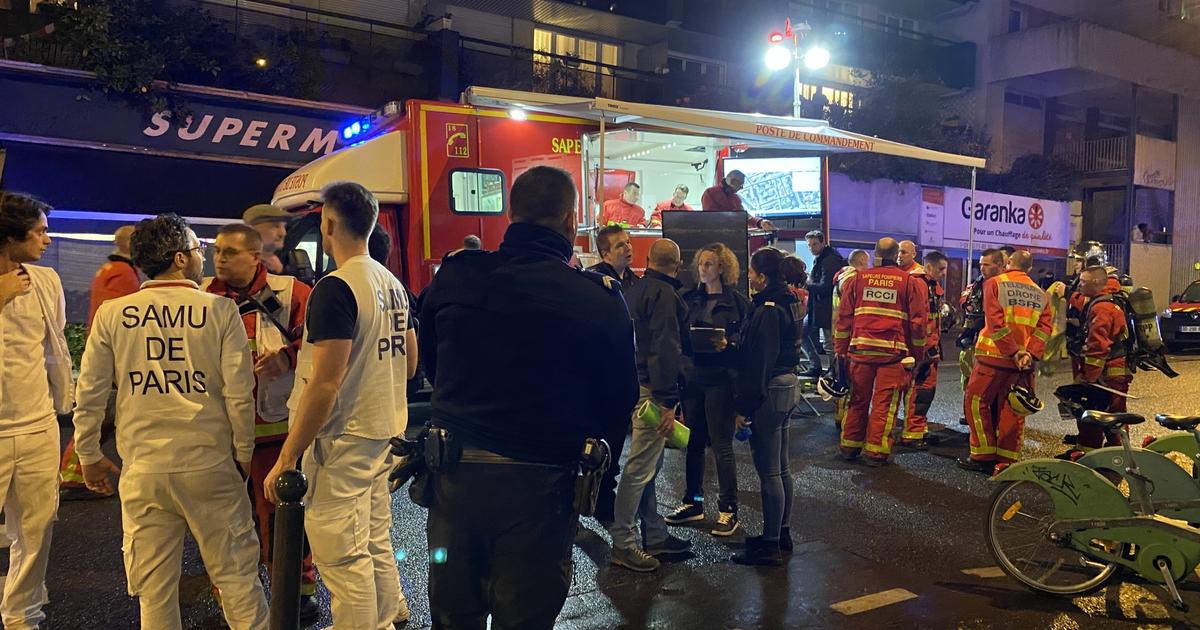Please smile in love with the camera. Click. Two punks in luck, arm in arm: Geralf, 24, and Antje, 21, in October 1988 in Potsdam.
But this love is a lie. Geralf Pochop lives in the GDR in Halle, Antje Nolte in the FRG in Braunschweig. They have just met for the first time, arranged by a friend who had made it from the East to Braunschweig. Antje imagined: "I am Antje and marry you out." Get out in the West. So that the Stasi believes that they are in love, Geralf wants to send the photos. He knows that the Stasi is reading his mail - for a long time.
Because Geralf is GDR punk of the first hour, the subculture is massively persecuted in the eighties. The Stasi has spied on him, threatened him, kidnapped him; he ended up in jail. His departure request remains unanswered. So he hopes for this false wedding, because the authorities must decide on marriage proposals in the short term.
Eike Berg
Photo for the Stasi: Geralf and Antje
His feelings are mixed. Because Geralf has a girlfriend he really loves - but in the GDR: Daniela Biernoth, also from the environment of the punk scene.
But Daniela can not leave. She is only 16.
Both are puzzling their heads. If the crazy plan worked out, it was probably with their relationship. Daniela could apply for departure at the age of 18 at the earliest. So young you do not plan the future, certainly not as a punk.
31 years later, Geralf Pochop and Daniela Biernoth are standing in front of the altar in the Protestant Christuskirche in Halle. Not because they want to get married, but because their story is about to begin here, at this special place, where the infrequent ones like them once offered one of the rare open spaces.
Pochop immediately searches for the bad punk on the altarpiece and mumbles: "He has to be somewhere." His eyes wander over the astonishingly unchristian, expressionist image: a naked woman next to a Soviet soldier with a crazy look, behind him a Stasi spy. But where is the punk, did his memory deceive him? Most recently, Pochop was here in GDR times.
photo gallery
24 pictures
Persecuted Punks in the GDR: "You are a gnawing rat at the foundation of socialism"At that time the altar is still called "Punk Altar" and Geralf is in the eyes of the Stasi itself a bad punk. He pokes in the church with like-minded people in a furious dance style reminiscent of a snap-on folding knife. Punk means for him freedom, the best that could happen to him in the GDR. The wooden church floor shakes when bands with pithy names occur: megalomania, tantrum, leftover, nameless.
The Stasi is located on the top floor of the school opposite and observes or prevents such concerts from 1983 onwards. In the church, the punks roar: "Turn on your telly, then you will not see our food, then you have your peace!" And: "Watch out, you will be guarded by the MfS-SS."
Dancing until one pulls the plug
The GDR sees in the "Pank" - as some officials write - a danger to the youth and drives people like Geralf in the musical underground. Churches are often the last refuges for the heartfelt concert texts: "Red slogans, Soviet power, have only brought us shit! Nazis, Nazis, Nazis back in East Berlin!"
Sometimes even the liberal church people feel too much. Then someone pulls the plug and asks the punks to sit down on the church floor; then the concert should continue. "At the first bar, everyone jumped up again," says Pochop.
Geralf Pochop
Punks in hall 1987
"I loved the straightforwardness of the bands and their courage," he says in the silence of the empty Christuskirche. The threefold family man does not look like a punk anymore. Dark shirt, the once wild, deep black curls are now shorter and grayer. Today he could dye it more easily; In the GDR, there was a lack of strong bleaching agents, so from necessity he resorted to a solution against athlete's foot. "She made great pink hair", Daniela Biernoth still knows.
She is also dressed simply. No self-sewn net tops, no black sprayed boots more. In the GDR, she often secretly changed her outfit in the basement. And concealed her parents Geralf.
He experienced his "happiest moments" in churches. The first punk concert in 1982 in the Luther Church, after he was able to record the music for years only from the West Radio. In 1983 the first punk festival of the GDR in the Christuskirche, organized by a courageous youth pastor, who disguised later festivals as "organ Knup"; is read backwards from "Knup" Punk.
"Taking off velvet gloves at Renitenz"
"I never thought I would see a punk band in the East," says Pochop. "And suddenly there was this music live, even in my city, without us having to stare at the West, which made life in the GDR much liveable." Until the regime pulled the reins.
The young people think of their youth differently: in the FDJ they march in rank and file, in youth clubs a "socialist dress code" applies. In this world, there is no room for "provocateurs" like Geralf, who lives in an orphaned house with a commune, refuses to do military service and carries a rat with him. As a punk, he feels freer. But: "I was also outlawed for the state."
In 1983 Stasi boss Mielke orders "hardness against punk". Even on the "unaesthetic appearance" can be 500 marks penalty. Musicians are locked away, punks are no longer allowed to visit cinemas, pubs, youth clubs, a second punk festival in the Christuskirche in Halle is stopped. A 1983 Stasi order dictates the line: "To tackle the subject matter, take off velvet gloves on proven renitence, we have no reason to deal with these figures delicately."
Pochop tells what he experienced in 1986: Men drag him into a car and drive into a lonely forest. He describes the interrogation as a single threat. Geralf is supposed to spy on the punk scene as IM, refuses and is taken away a second time, this time to a secret Stasi office in a demolished building. Again he refuses everything.
When the men let him go, he feels mortal fear. Is not he an acquaintance of the secret bureau? From now on, he just wants to get away, also because every perspective is missing: The state treats him like an outlaw and lets the trained radio mechanic only do auxiliary work as a gaffer or food spit.
He applies for expatriation. At first Geralf was unruly but unpolitical. Now he is considered an enemy of the state and is sentenced in October 1987 because of "public degradation" of the GDR to six months, at times imprisoned with felons.
He remains faithful to the music and meets Daniela Biernoth in 1988, who is enthusiastic about The Cure but also listens to Eastern punk bands like Schleimkeim. Soon after, the farce begins the fictitious marriage. That her boyfriend wants to marry another? "Not a great feeling," says Biernoth today.
Three days of howling
On December 20, 1988, Geralf and Antje got engaged in Halle. She gives him a fiery red West hair color. Again they mimic the happy couple. The Stasi bites. On the way back to Braunschweig, Antje is interrogated at the border for hours. A New Year's Eve trip to Hungary follows.
Suddenly, however, the requested marriage is superfluous. Surprisingly, Geralf's permit to leave the country is approved. On April 27, 1989, he is allowed to leave the GDR. When leaving Daniela loses her composure, curses on the Stasi. "Our future ended abruptly at 10 o'clock that day at the station," she recalls. "I howled for three days."
Geralf Pochop
Daniela and Geralf in Budapest
Even telephoning becomes a problem. Daniela's family has no connection, so both have to date a friend's phone and can not talk openly. So the couple is looking forward to a summer holiday in Hungary. "I did not plan to escape and only use summer clothes," says Biernoth. "But when we met at the train station in Budapest, it was immediately clear that we would not part."
Geralf tramps to Germany, with the passport of his girlfriend. He wants to have a West German passport issued for them, but in the registration office one looks dumbfounded and rejects him.
Frustrated, he returns to Hungary. What to do? Again help punks, this time Hungarian. A strikingly similar young woman gives Daniela her passport; Hungarian citizens are allowed to travel to Austria. Now Daniela has a Hungarian identity but does not speak the language. And if the border guards ask something? Her three companions in the car arrange secret signs. If she is touched by foot, she should nod.
Geralf drives up in a second car and stares into the rearview mirror: "Now it was on the verge, freedom or jail."
Canned ravioli and the fall of the wall
"I held my breath," recalls Daniela Biernoth. No complex questions, her car is let through. On the radio is "Satisfaction". She does not like the Stones but feels wonderful: "I was seventeen and a half and totally in love, the world was open to me."
Price query time:
05.11.2019, 17:02 o'clock
No guarantee
DISPLAY
Geralf Pochop
Underground was strategy. Punk in the GDR: Between Rebellion and Repression
Publishing company:
brain food
Pages:
200
Price:
EUR 20,00
Buy from Amazon Buy from Thalia
Product information is purely editorial and independent. The so-called affiliate links above, we usually receive a commission from the dealer when buying. More information here.
It will not be easy. Geralf is also afraid of the Stasi in the West. To blur tracks, send the two extra from Amsterdam a telegram to the GDR. And out of fear, as minors, the West German authorities could send them back, Daniela gives her GDR passport as lost and makes a year older. Because of the missing documents, she gets no social assistance, the money is scarce, there are often Dosenravioli.
The couple lives in West Berlin, in December 1989 Daniela 18 - just before the wall falls. You can not believe it and go there. They do not believe in a permanent opening until the day after they hammer out chunks from the wall and meet friends from Halle. "Before, I thought: I can only have Geralf or my family," says Biernoth. "Suddenly I had both of them, that was such a nice moment."
And yet her story does not end happily. Four years later her relationship breaks up. Today, Geralf Pochop and Daniela Biernoth are good friends. The memory connects, even now, as they search together for the punk on the altarpiece in Halle. Is it perhaps the man with headphones and devilish look? No matter. Punk has changed her life forever anyway.
Geralf Pochop reads from his book "Underground was strategy", here the next dates.









